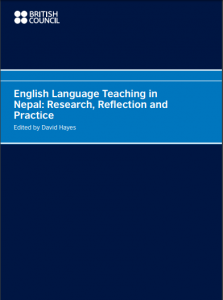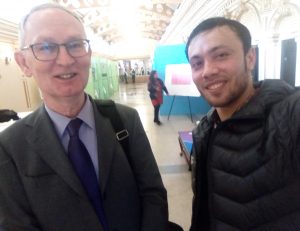Talking with an Editor on Writing and ELT
Jeevan Karki*
British Council has recently published a book titled “English Language Teaching in Nepal: Research, Reflection and Practice” (2018). This volume is edited by Dr David Hayes. He is an associate professor at Brock University, Canada and an independent education consultant. 
This volume is a collection of 14 research papers including a majority of voices of Nepalese ELT practitioners focusing on ELT and critical analysis of the role of English in Nepal. On his remarks on its publication, Dr Lava D Awasthi, the chairperson of the Language Commission of Nepal states, “…it will serve as a resource kit for language planners, policymakers, practitioners and stakeholders.” He further adds, “…it is groundbreaking… drawing on national and international perspectives and practices, theorizing the issues generated from practical experiences and research-based empirical evidence.” On his foreword, Alison Barrett, the director, Education and society, East Asia (British Council) mentions, “…this volume will stimulate considered debate around the role and position of English within the education system in Nepal, and will enable agents of change… to make informed choices… on the quality of English language teaching, learning and assessment in Nepal…”
This book is divided into three sections. First, international perspectives (on ELT), which includes the papers of Rhona Brown, Pritivi N. Shrestha and Amol Padwad. Second, Sponsored research studies, which covers the other three papers of Min Bahadur Ranabhat and Subodh Babu Chiluwal, with Richard Thompson. Finally, the third section- Case studies includes the eight case studies of Ushakiran Wagle, Eak Prasad Duwadi, Laxmi Prasad Ojha, Jeevan Karki, Gopal Prasad Bashyal, Ashok Raj Khati, Laxman Gnawali and Vaishali Pradhan.

As the volume is out in the market, we thought of sharing the thoughts and reflection of the editor in editing the valuable volume. I managed to briefly talk with Dr. Hayes.
Jeevan: Dr. Hayes, you have recently edited a volume “English Language Teaching in Nepal: Research, Reflection and Practice”, which includes 14 chapters. Based on this valuable experience, what is your reflection on the writing of Nepalese ELT practitioners? What are the strengths in their writing and what could be done to make their writing even stronger and better?
Dr. Hayes: Nepalese practitioners are experts in their contexts and my job was just to help them to clarify their ideas and put everything together in a way which allowed them to make their contributions to the book the best that they could be. The strength in the writing generally was in bringing the Nepali school contexts to life so that readers elsewhere could see what was positive about teaching and learning English in Nepal, what the challenges were and where improvements could be made. Good writing is really all about practice and knowing the requirements of the publication you are writing for and its readership. Nepalese practitioners just need opportunities to be given- opportunities to write and to publish for both local and international audience. The more they write, and the more editors (of journals and, I hope, more books like ‘English Language Teaching in Nepal: Research, Reflection and Practice’) help them, the more proficient they will become.
Jeevan: Having gone through the research and practices in Nepalese ELT, where do you locate the ELT practices in Nepal in relation to the trends and practices in the world?
Dr Hayes: I think it’s always best to look at ELT practice in terms of how appropriate it is to the local context. However, there are clear trends which are present in Nepal just as in other countries worldwide. The most obvious of these is the expansion of English-medium education, even at the primary level. Personally, I don’t think this serves the interests of the majority of children well. International research shows that children are most successful educationally when they are taught in their first language and become literate in that language in the early years of schooling. Of course, this is a challenge for multilingual societies like Nepal but experience elsewhere shows that primary education in the first language can be achieved and, not only that, children are often more successful at learning another language such as English in later years too. The danger of English-medium education when the language is not available and regularly used in the local environment is that children often end up not learning anything very well. The work of the Language Commission in Nepal is extremely important in this respect. There is, of course, still a place for English language teaching but I think there needs to be some serious reflection about its place in the overall education system in Nepal. The educational interests of the children must come first.
English Language Teaching in Nepal: Research, Reflection and Practice
Mr Karki is one of the editors of this magazine and an independent teacher trainer*